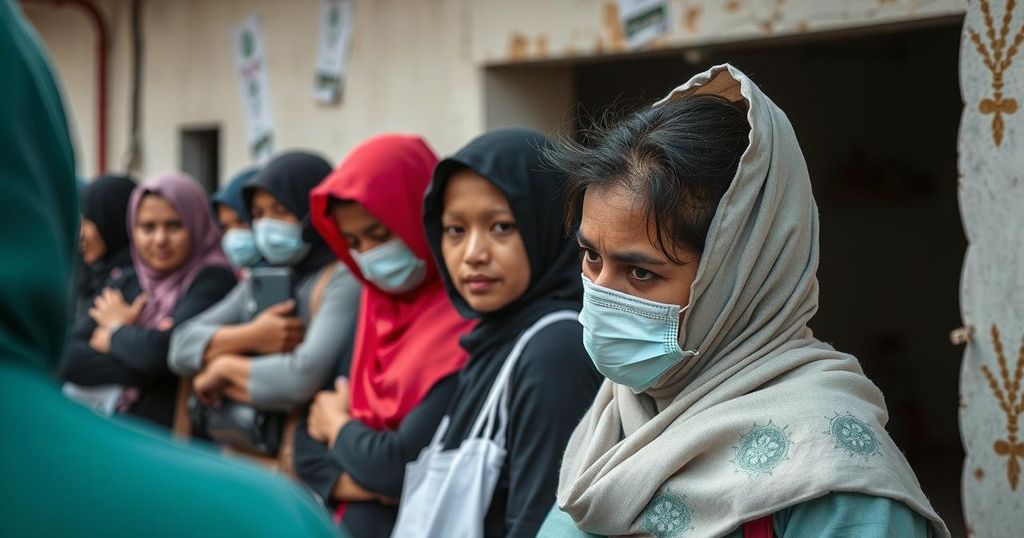The conflict in Lebanon, triggered by a Hamas-led attack on Israel, has left about 177,000 migrant workers, primarily women from Africa and Asia, stranded as employers flee. Many workers are facing dire living conditions, relying on community support as evacuation options dwindle and costs surge. The kafala system exacerbates their vulnerability, mirroring experiences from previous crises.
The ongoing conflict in Lebanon, ignited by a Hamas-led assault on Israel, has caused immense devastation and rendered numerous individuals homeless. Among those most severely affected are approximately 177,000 migrant workers, predominantly women from Africa and Asia, who find themselves vulnerable and abandoned as their employers flee the violence. One such worker, Lina, a 29-year-old housekeeper from Kenya, remains isolated in her Beirut residence, following her employers’ abrupt departure amidst the turmoil.
The plight of Lina underscores the harrowing experiences shared by countless migrant workers navigating their precarious circumstances without any assistance. As residents of Lebanon pursue safety, the dire conditions of low-paid migrant workers have come under increased scrutiny. Many of these workers are ensnared in the exploitative kafala system, which binds their legal status to their employers, leaving them with few avenues for alternative employment in times of crisis.
Overcrowded shelters have reached a saturation point, with many migrant workers facing the harsh reality of sleeping on the streets, significantly heightening their exposure to acts of violence and abuse. Reports reveal widespread discrimination and perilous living conditions, particularly endangering women. In light of these developing circumstances, community organizations such as Egna Legna have been mobilizing to offer essential support to affected individuals.
Organizational founder Banchi Yimer states that her team has documented over a thousand abandoned workers within a mere few days, illustrating the immediate need for comprehensive aid. Nonetheless, addressing the extensive scale of this crisis proves to be an arduous challenge. Limited resources from various embassies, including those from Ethiopia, Sri Lanka, and the Philippines, offer some respite to their nationals through temporary shelters, yet many migrants remain stranded and without help.
Moreover, the surge in evacuation flight costs, which have recently more than doubled, presents an insurmountable barrier for many. The Kenyan government has actively cautioned against travel to Lebanon due to the absence of formal labor agreements and assured rights; however, this advisory does little for those who are currently caught in such precarious conditions. Vionnah Kerubo, another Kenyan domestic worker, articulates the growing despair as her employer continues to deny her release amidst intensifying bombardments.
The current crisis bears resemblance to the experiences of migrant workers during the COVID-19 pandemic when many faced abandonment from employers who were unable to meet their financial obligations. The inadequate response from consulates has exacerbated the suffering, compelling migrant workers to rely solely upon each other for survival and support in their time of need.
The Lebanon crisis has escalated dramatically in recent weeks, primarily due to violent confrontations following an attack by Hamas on Israel. This conflict has not only resulted in significant loss of life but has also led to widespread displacement of residents, including migrant workers who are typically employed in various sectors, particularly domestic service. Many of these workers hail from African and Asian countries and are subject to the kafala system, which regulates their legal status and can lead to exploitation. In the wake of the crisis, a number of migrant workers have found themselves abandoned by their employers and vulnerable to a host of dangers, including violence and homelessness.
This ongoing crisis in Lebanon has starkly highlighted the precarious situations faced by migrant workers who have become collateral damage in the conflict. With their employers fleeing, these individuals are left without means of support or shelter, exacerbating their vulnerabilities. Community organizations are stepping forward to provide essential aid, yet the scale of the challenge remains daunting. The restrictive kafala system, prior inadequacies in response from diplomatic channels, and the escalating costs for evacuation present significant hurdles for these workers seeking safety and stability. This humanitarian crisis demands urgent attention and action from both local and international stakeholders.
Original Source: www.mwakilishi.com






